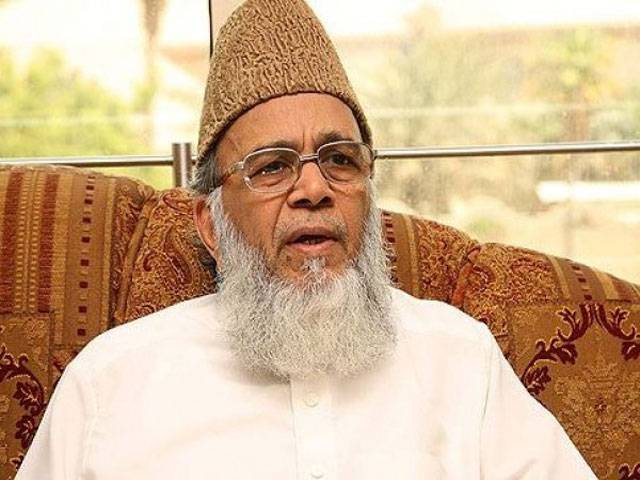In a rare rejoinder by the military to Munawar Hassan’s odious remarks, the ISPR press release referred to them as irresponsible and misleading; and called for an unconditional apology from him for hurting the feelings of the families of Pakistani soldiers who were martyred while fighting terrorists. People belonging to all strata of society have taken exception to the remarks of Ameer Jamat-e-Islami in an Interview in a private TV channel. He said: “US soldiers killed fighting the Taliban were not martyrs; then their supporters could also not be considered martyrs”. In an earlier statement he had referred to former Pakistani Taliban chief Hakimullah Mehsud as a ‘martyr,’ but it could not have stirred outrage considering his personal opinion. Political leaders and quite a few religious leaders have condemned his remarks. The Sindh Assembly on Monday also passed a resolution condemning Jamat-i-Islami (JI) Ameer Munawar Hassan’s remarks. The resolution was presented in the provincial assembly by PPP, MQM, PML-N and PML-Functional. Assembly members called on Hassan to tender an unconditional apology to the nation.
In response to the ISPR press release condemning Hassan’s statement, the JI convened a meeting on Monday. After the Shura meeting, General Secretary of Jamaat-i-Islami (JI) Liaquat Baloch said that the “Inter-Services Public Relations (ISPR) had issued a political press release, which was unbecoming of a military force”. Speaking to media representatives after a meeting of the party’s Majlis-i-Shura (Advisory Council), Baloch said “the army had no right to interfere in political matters of the country”. At this point in time when Pakistan faces challenges to its internal and external security, such remarks could make detractors of Pakistan happy. It was expected that JI leaders would see reason and would apologize for odious remarks that hurt the families of those who laid down their lives so that others could live; but they opted for drawing more flak from the politicians, intellectuals and opinion makers. In fact, enemies of Pakistan have been trying to paint Pakistan military in bad light, in which they have utterly failed, as people of Pakistan hold the armed forces in very high esteem and nobody can snatch that honour and reverence.
There is a perception that religious parties that had opposed creation of Pakistan are creating conditions to prove their point that they were right. Of course, during Pakistan movement a cross-section of the people had divergent views about the struggle for separate homeland for Muslims of the sub-continent. Jamat-e-Islami (JI) and Jamiat-i-Ulema-i-Hind (JUI) had opposed Quaid-e-Azam and All-India Muslim League on the demand for a separate homeland for Muslims. The JUI-Hind opposed the concept of Pakistan because it did not agree with the two-nation theory. However, JI opposed the movement on the basis that it did not believe in nation state, and that Muslim League leadership was not capable of enforcing Islamic injunctions in the country. In an article authored by late Qazi Hussain Ahmed shortly before his death, he claimed that Quaid-e-Azam and JI had the same objectives. If that were true, the JI would not have opposed the Quaid during Pakistan movement. However, one should not doubt the intentions of late Maulana Maudoodi when he opposed Pakistan movement on the basis of his conviction that Islam does not believe in the concept of nation-state.
Anyhow, when Pakistan came into being, Maulana Maudoodi, Wali Khan, and those ulema of Jamiat-i-Ulema-i-Hind who accepted Pakistan’s reality, there should be no complaint against what they had professed before creation of Pakistan. But at the same time, those who had opposed Pakistan have no right to impose their perception of Islam, which is at variance with majority of the people of Pakistan. One would not know if the government and military are on the same page; but one can say with confidence that military leadership is committed to act according to the orders of the elected government. It did not become a stumbling block in the much-touted talks with the militants; it rather supported the government in its efforts to achieve peace through dialogue. Present military leadership had given tough time to the super power when Pakistan stopped transit facility to NATO for eight months.
Jamat-e-Islami has in the past supported dictators Yahya Khan and had described his draft constitution as Islamic, which was to be enforced in case the National Assembly could not pass the constitution within certain period of time. They had supported General Zia-ul-Haq and were part of his shura and cabinet. By denigrating military and intelligence agencies, they are advancing enemies’ agenda to weaken the armed forces. Already, enemies of Pakistan through machinations like attack on Abbottabad compound, Salala check posts and attacks on assets through their proxies have been trying to make military and agencies controversial so that they could force Pakistan to do their bidding.
It is hoped that JI would review its position and withdraw Hassan’s remarks, as the country cannot afford confrontation between the political parties and the institutions.
Friday, April 19, 2024
Munawar Hassan’s remarks stir outrage

King Charles's cancer ‘eating him alive,' monarch unable to perform duties: Insider
1:02 AM | April 19, 2024
Mehwish Hayat says she would like to work with Aamir Khan
9:59 PM | April 18, 2024
What caused record-breaking rainfall in UAE?
9:58 PM | April 18, 2024
Donald Trump discusses Ukraine, Middle East, NATO with Polish President Duda
9:57 PM | April 18, 2024
'That'll be awesome,' Rohit Sharma on idea of Pakistan vs India Test series
9:17 PM | April 18, 2024
Hepatitis Challenge
April 18, 2024
IMF Predictions
April 18, 2024
Wheat War
April 18, 2024
Rail Revival
April 17, 2024
Addressing Climate Change
April 17, 2024
Justice denied
April 18, 2024
AI dilemmas unveiled
April 18, 2024
Tax tangle
April 18, 2024
Workforce inequality
April 17, 2024
New partnerships
April 17, 2024
ePaper - Nawaiwaqt
Advertisement
Nawaiwaqt Group | Copyright © 2024





